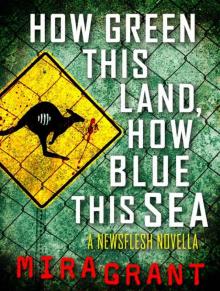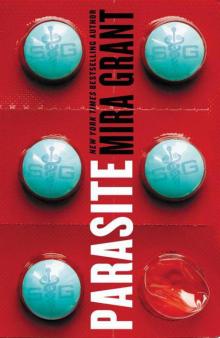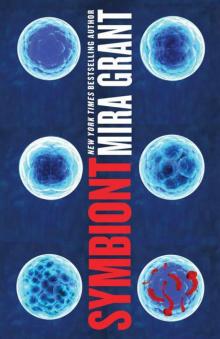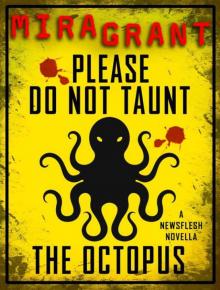- Home
- Grant, Mira
Please Do Not Taunt the Octopus Page 11
Please Do Not Taunt the Octopus Read online
Page 11
I depressed the SEND button. “That’s a very kind offer, Clive, but I’m afraid I’m going to have to refuse. You see, I have some very delicate experiments going on here, and while it would be super fun to find myself kneeling in front of you with a pistol in my mouth, it would make it hard to chart the data. Go home. We’re not letting you in.”
“I have more guns, better men, and more ammo,” said the radio. “What can you possibly have that could stand against me?”
“Well gosh, I dunno, but there’s a lot of walls, and a big black dog, and did you know there was an octopus? Because there’s an octopus. I haven’t seen one of those in years.” The voice was female, and absolutely giddy with delight. It was also a little higher pitched than I expected, like its owner had somehow slid backward through time, to a simpler age—fourteen or fifteen, young enough not to really care about consequences or costs. I turned.
Elaine Oldenburg wasn’t standing behind me: Elaine Oldenburg had left the building, possibly forever, courtesy of Tom’s space lobster juice. Instead, I was looking at the Fox, last of the Monkey’s girls and pure killing machine in hospital scrubs and pigtails. She was grinning from ear to ear, the face of a woman whose connection to reality was no longer quite strong enough to serve as any kind of tether. She had managed to find half a dozen guns somewhere and had them tucked into the elastic waistband of her pants like this wasn’t an incredibly dangerous thing to do. She was holding a scalpel in each hand.
I wasn’t sure which to be more impressed by: her transformation into a character out of a pre-Rising comic book, or the fact that she’d managed to do it without setting off any alarms or triggering a panic among my staff. “The octopus is named Barney; I’ll introduce you to him later,” I said. “Did you kill anyone?”
“Not yet,” she said. “But the day is young, and there’s always time for a party.”
“Right,” I said. People around the room were turning to stare at us—more at her than at me, admittedly, since I was nowhere near as exciting, visually speaking, as a relative stranger with a whole lot of guns. “So you know, killing anyone who works for me will not constitute a party. It may, however, get you thrown out. Do we have an understanding?”
“I’m not stupid, Dr. Abbey. Don’t ever, ever make the mistake of thinking that I am. Kitty made that mistake. She didn’t make too many after.” The Fox beamed first at me, and then at Joe. “Hello, doggy! I’m sorry I tried to shoot you before. You were scary, and I was confused. I won’t try to shoot you anymore.”
Joe looked at her, ears cocked, and made the small boof sound that meant he was confused but curious, and willing to explore the situation further. The Fox beamed.
“This is adorable and all, but Clive is at our gates, so I need to get back to negotiating with the megalomaniac now,” I said. “The man on top of the ladder is Tom. He’s in charge of making sure we all come through this alive. Check in with him, and then do whatever you can to bring us through this alive.”
Something hardened in the back of her eyes, turning reptilian and cold. “Are those your orders?” she asked. “Do whatever I can to bring us through this alive, and try not to kill anyone who’s currently inside?”
I nodded. “Those are my orders. Do you understand them?”
“That’s the second time you’ve asked me that. Slow pupils don’t make it to the head of the class, but they do get gold stars for participation.” She was still too thin, this wild-eyed woman with the guns shoved into her pants and a raging case of bedhead. She looked like she could be broken over a larger person’s knee with a minimum of effort. And she was somehow, despite all that, still scary as hell. “I understand your orders. Better make sure everyone else understands them too. Where’s the back door?”
The question was enough of a left turn that I paused for a moment before turning to the nearest group of armed interns and snapping, “Carlton! Take our guest to the back door, unlock it, and let her out.”
The Fox smiled. “Better. See you soon, Dr. Abbey. Remember, I’m your dog now. Woof.” Then she was gone, running fleetly over to Carlton, who looked like he couldn’t decide whether he was being rescued from the shootout to come or sentenced to something even worse. She grabbed his arm, pulling him away from the others, and together they ran to the back of the room and disappeared.
The radio squawked as Clive began transmitting again. “Abbey? I hope you don’t think that you can improve my temper by ignoring me. You’re actually accomplishing just the opposite. I don’t take kindly to being left hanging in front of my men.”
“Sorry, Clive, just dealing with some personnel issues here inside my lab. Note the possessive. This is my lab, and these are my people, and while I appreciate your interest, I really am going to have to decline.”
“Your call, Abbey. A pity. I really thought you cared about their lives.”
The transmission ended. The gunfire began.
3.
Firefights are never as clean as they appear in the movies, where even a shot to the throat never seems to coat the surrounding areas with blood the way that they really ought to. Before the Rising, it was because no one wanted to offend the delicate sensibilities of the women and children that people assumed were flocking to Buckets of Blood III: The Bucketing because of its complex themes of abandonment and human nature. After the Rising, it became a matter of public safety. People who saw that much blood were likely to lose their tempers, their lunches, and their sense of proportion, in that order.
Clive was not playing by MPAA rules. His men unleashed a barrage of gunfire on the front of the forestry center, shooting through the weak points in the wood and sending bullets lancing through the room. Someone cried out. Someone hit the floor. I heard Tom shout, “Return fire!” and then there were guns going off in the enclosed lobby, their reports sounding out loud and angry over the cries and screams of my people.
Joe barked, adding even more chaos to the scene. I grabbed his collar before he could start trying to bite bullets out of the air. He wasn’t fast enough—he was an experimental subject, not a miracle—but that wouldn’t stop him from trying, if he got offended enough by what was going on.
“Stay,” I hissed, hunching down. Clive and his men were still visible on the monitor. I wasn’t the only one with a view on the outside: As I watched, three of his people went down, targeted by my security. One of the shooters fell off her platform immediately afterward, targeted by someone who had been able to analyze her position based on the trajectory of her shot. Her head split when she struck the floor. Three more of my people were immediately there, one of them putting a bullet in her forehead while the other two were pouring bleach on the resulting hot zone.
Gunfights before the Rising only killed you one way. Now they get you coming and going, as the dead rise up and make the situation even worse. That might explain Clive’s bullet-spraying tactics. If he shot enough of us, we’d have an outbreak on our hands. Then he could just walk away and come back later to clean up whatever was left.
We’d weathered outbreaks before. Whatever Clive thought of us, we were tougher than he knew. But it was sort of hard to focus on that with bullets passing overhead and people screaming all around me.
There was a flash of motion on the monitor. I tracked it with my eyes, and clapped a hand over my mouth to cover my gasp as it resolved into the Fox, still barefoot and dressed in borrowed surgical scrubs, with a scalpel clutched firmly in each hand. She was approaching from the side, in Clive’s blind spot—even if he’d had people watching that zone before the shooting started, they were all preoccupied now, trying to take us out before we could do the same to them. That explained why she wasn’t shooting. Gunshots would have attracted attention.
She caught the first of Clive’s hired guns before he had a chance to realize that he was in danger. The scalpel sliced across his throat with almost surgical precision, and then she was gone again, vanishing into the underbrush, leaving him to drop his gun and clutch helplessly at
his throat. It wasn’t going to do him any good. He was a dead man walking now, a dead man stumbling back toward his own people and grasping for them, grasping for anything that would let him hold on to life for just a little bit longer. Human beings don’t die easy. If we did, the Rising would have been a lot shorter, and would have had a very different ending.
One of the other mercenaries shouted something as her wounded comrade stumbled into her, coating her in a layer of blood that was surely hot with live Kellis-Amberlee. She fired twice, and the man the Fox had wounded collapsed. The woman had barely a second to breathe before one of the other mercenaries turned and shot at her, sending her toppling after him. She’d been exposed. They couldn’t risk it.
“Goddammit, Abbey, what sort of bullshit do you think you’re pulling?” demanded the radio. Clive sounded angrier than I’d ever heard him. It was almost comic, in a way. He was the one attacking us, yet we were the ones refusing to play along with whatever narrative he had crafted in his power-addled little mind. How dare we not just roll over and die? It was so unreasonable of us.
I’ve always been unreasonable like that. I pressed the button on the PA, and said, “Well, I don’t know. I tend to file this sort of bullshit under ‘defending my home.’ Take your people and leave, Clive. You don’t have enough men to storm this castle.”
“I’ll be back, Abbey,” said Clive. “I’ll be—”
“No, you won’t,” said the Fox, her voice coming through the radio so clearly that for a moment, I thought she had somehow gotten back inside. A thick gurgling noise followed her announcement. I turned to the monitor to see her standing behind Clive, the tip of her scalpel protruding through the front of his throat.
He gurgled again before he fell, collapsing like a sack of wet laundry. The Fox beamed, waving enthusiastically toward the forestry center.
That’s when one of his remaining men shot her.
Chapter 6
Sterilizing the Lab
We can raise the dead. We can cure cancer. We can make the world better in every possible way, save one: No matter how hard we try, we just can’t cure stupid.
—Dr. Shannon Abbey
Everyone’s living in a fantasy world these days. The only thing that matters is whether your fantasy is hurting anybody else. If it’s not, then who am I to judge?
—Tatiana Markowski
1.
“Dr. Abbey?”
I was sitting on the edge of the wading pool with Barney’s tentacles wrapped around my forearms, sharing a content moment with my resident troublemaker. Joe was on the floor nearby, head on his paws, silently judging me for loving a boneless squishy thing more than I loved him. Judge on, big guy, judge on. I turned at the sound of my name. Jill was standing in the doorway, a cast on her left arm and a line of stitches on her forehead. It was going to heal without a scar. Most of the wounds we’d suffered were.
Most, not all. Three of my staff were dead; the main lobby was still closed off for decontamination and repair. We’d burnt six of Clive’s people, as well as Clive himself, after we had pumped enough lead into them that they weren’t going to get up again. Not all wounds heal easy. Not all wounds should.
“What is it?” I asked.
“She’s awake.”
2.
The Fox—Elaine—whatever the hell she wanted to be called—was back on her bed in the observation room, staring up at the ceiling. She turned her head toward me when I came in, and her eyes were just unfocused enough that I knew I was going to be speaking to the killer, not to the tender of children. That was fine by me. I’ve never really known how to talk to people who chose to spend a lot of time around kids. Bullets and blood, those are things I’m more familiar with.
“The bullet nicked your liver and perforated your intestine,” I said, skipping “hello” in favor of a status update. “We were able to repair most of the damage laparoscopically. We didn’t even have to sedate you, thanks to all the drugs you’re on. Thanks for saving us the trouble.”
“Am I going to die?” she asked. She sounded almost hopeful.
“Not this time.”
“Oh.” She frowned before looking at me mistrustfully and asking, “Are you here to throw me out?”
“Why the hell would I do that? This is where you go when you get broken. I’m a scientist. I fix the toys that other people throw away.” Toys like Zelda, who was still trying to figure out whether she was staying with me or heading back to the CDC. Toys like Tessa, who might not be trustworthy but deserved to be trusted all the same. Everyone’s a toy to somebody.
The Fox—Elaine—whatever—blinked at me, uncomprehending.
Then, slowly, she smiled.
Meet the Author
Mira Grant lives in California, sleeps with a machete under her bed, and highly suggests you do the same. Mira Grant is the pseudonym of Seanan McGuire—winner of the 2010 John W. Campbell Award for best new writer. Find out more about the author at www.miragrant.com or follow her on twitter @seananmcguire.
Photo Credit: Carolyn Billingsley
Also by Mira Grant
PARASITOLOGY
Parasite
Symbiont
Chimera
THE NEWSFLESH TRILOGY
Feed
Deadline
Blackout
Apocalypse Scenario #683: The Box (e-only novella)
Countdown (e-only novella)
San Diego 2014: The Last Stand of the California Browncoats (e-only novella)
How Green This Land, How Blue This Sea (e-only novella)
The Day the Dead Came to Show and Tell (e-only novella)
Please Do Not Taunt the Octopus (e-only novella)
WRITING AS SEANAN MCGUIRE
Rosemary and Rue
A Local Habitation
An Artificial Night
Late Eclipses
One Salt Sea
Ashes of Honor
Chimes at Midnight
The Winter Long
Discount Armageddon
Midnight Blue-Light Special
Half-Off Ragnarok
Pocket Apocalypse
Sparrow Hill Road
Indexing
Indexing: Reflections
If you enjoyed
PLEASE DO NOT TAUNT THE OCTOPUS,
look out for
PARASITE
PARASITOLOGY VOLUME 1
by Mira Grant
Interlude 0: Genesis
My darling ones, be careful now, and don’t go out alone.
—Simone Kimberley, Don’t Go Out Alone
Here there be monsters.
—Dr. Shanti Cale
August 17, 2015: Time stamp 15:06.
[The recording is crisp enough to look like a Hollywood film, too polished to be real. The lab is something out of a science fiction movie, all pristine white walls and gleaming glass and steel equipment. Only one thing in this scene is fully believable: the woman standing in front of the mass spectrometer, her wavy blonde hair pulled into a ponytail, a broad smile on her face. She is pretty, with a classic English bone structure and the sort of pale complexion that speaks less to genetics and more to being the type of person who virtually never goes outside. There is a petri dish in her blue-gloved hand.]
DR. CALE: Doctor Shanti Cale, Diphyllobothrium symbogenesis viability test thirty-seven. We have successfully matured eggs in a growth medium consisting of seventy percent human cells, thirty percent biological slurry. A full breakdown of the slurry can be found in the appendix to my latest progress report. The eggs appear to be viable, but we have not yet successfully induced hatching in any of the provided growth mediums. Upon consultation with Doctor Banks, I received permission to pursue other tissue sources.
[She walks to the back of the room, where a large, airlock-style door has been installed. The camera follows her through the airlock and into what looks very much like an operating theater. Two men are waiting there, faces covered by surgical masks. Dr. Cale pauses long eno
ugh to put down her petri dish and put on a mask of her own.]
DR. CALE: The subject was donated to our lab by his wife, following the accident which left him legally brain dead. For confirmation that the subject was obtained legally, please see the medical power of attorney attached to my latest progress report.
[The movement of her mask indicates a smile.]
DR. CALE: Well. Quasi-legally.
[Dr. Cale crosses to the body. Its midsection has been surrounded by a sterile curtain; the face is obscured by life support equipment and by the angle of the shot. She pulls back the curtain to reveal the gleaming interior of the man’s sliced-open abdomen. The skin has been peeled back and the blood has been suctioned away, revealing a wide array of colors. Liver brown, intestinal green and glistening white, and the smooth pink sac of the stomach. Calmly, she reaches into the man’s body, pushing organs aside until the surface of the small intestine is revealed.]
DR. CALE: Scalpel.
[One of the masked men passes her the requested tool. She takes it, pressing down against the man’s intestine. He does not move. Her hand does not tremble.]
DR. CALE: I am not following strict sterile protocol, in part because infection is not a risk. The subject’s immune system has been supplemented. D. symbogenesis eggs were introduced to the subject’s system six days ago, fed into his body along with the nutrient paste we have been using to preserve basic biological functions.

 How Green This Land, How Blue This Sea: A Newsflesh Novella
How Green This Land, How Blue This Sea: A Newsflesh Novella Parasite (Parasitology)
Parasite (Parasitology) Symbiont (Parasitology Book 2)
Symbiont (Parasitology Book 2) Please Do Not Taunt the Octopus
Please Do Not Taunt the Octopus